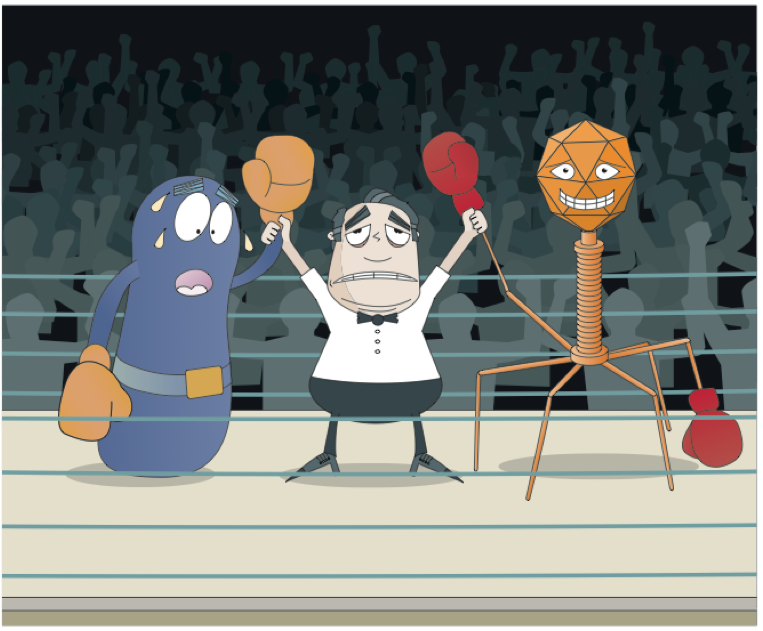Associate Professor
Education
Postdoctoral Fellow, Department of Molecular Biology & Microbiology, Tufts University School of Medicine
Ph.D. Microbiology and Biotechnology, University of Alberta

Kåhrström C.T. 2013. Phages level the playing field. Nature Reviews Microbiology. 11: 300-301. (Link)
Our lab investigates the impact of phages on the evolution and epidemiology of Vibrio cholerae, which is the causative agent of the severe diarrheal disease cholera. As a waterborne disease, cholera is a serious threat in areas of the world where sanitation is poor and access to safe drinking water is limited. Phages that specifically infect and kill V. cholerae are thought to modulate the inter-epidemic persistence of V. cholerae in the environment, thus impacting the occurrence and severity of outbreaks; however, uniquely, these phages also travel with V. cholerae into the human host and continue to prey on their bacterial host during infection. Therefore, phages have the unique potential to impact all aspects of the V. cholerae life cycle (including environmental persistence, infectivity and dissemination), on both a short and long-term evolutionary scale.
Our current focus is towards an understanding of the molecular basis for the anti-phage activity of a group of mobile genetic elements in epidemic V. cholerae. You can find more on our website!
1. Angermeyer A, Hays SG, Nguyen MHT, Johura FT, Sultana M, Alam M and Seed KD. 2022. Evolutionary sweeps of subviral parasites and their phage host bring unique parasite variants and disappearance of a phage CRISPR-Cas system. mBio. 13(1):e0308821. (Link)
2. LeGault KN, Barth ZK, DePaola P and Seed KD. 2022. A phage parasite deploys a nicking nuclease effector to inhibit replication of its viral host. Nucleic Acids Research. gkac002. (Link)
3. Boyd CM, Angermeyer A, Hays SG, Barth ZK, Patel KM and Seed KD. 2021. Bacteriophage ICP1: A persistent predator of Vibrio cholerae. Annual Review of Virology. 8:285-304. (Link) [Review]
4. LeGault KN, Hays SG, Angermeyer A, McKitterick AC, Johura FT, Sultana M, Ahmed T, Alam M and Seed KD. 2021. Temporal shifts in antibiotic resistance elements govern phage-pathogen conflicts. Science. 373, eabg2166. (Link) (OA link)
Notable media coverage:
- Perspective: Meaden S, and Fineran PC. 2021. Bacterial defense islands limit viral attack. Science. 374:399-400. (Link)
5. Barth ZK, Nguyen MHT and Seed KD. 2021. A chimeric nuclease substitutes a phage CRISPR-Cas system to provide sequence specific immunity against subviral parasites. eLife. 10:e68339. (Link)
6. McKitterick AC, LeGault KN, Angermeyer A, Alam M and Seed, KD. 2019. Competition between mobile genetic elements drives optimization of a phage-encoded CRISPR-Cas system: Insights from a natural arms-race. Philosophical Transactions of the Royal Society of London. Series B, Biological Sciences. 374:20180089. (Link)
7. O’Hara BJ, Barth ZK, McKitterick AC and Seed KD. 2017. A highly specific phage defense system is a conserved feature of the Vibrio cholerae mobilome. PLOS Genetics. 13: e1006838. (Link)
8. Seed KD, Lazinski DW, Calderwood SB and Camill A. 2013. A bacteriophage encodes its own CRISPR/Cas adaptive response to evade host innate immunity. Nature. 494:489-491. (Link)
Notable Media coverage:
- News and Views: Villion M., and Moineau S. 2013. Virology: Phages hijack a host’s defence. Nature. 494:433-434. (Link)
- Research Highlight: Kåhrström C.T. 2013. Phages level the playing field. Nature Reviews Microbiology. 11: 300-301. (Link)
- News article: A Virus That Steals A Bacterium’s Immune System And Uses It As A Weapon. Popular Science, March 4, 2013. (Link)
- News article: The virus that learns. National Geographic Phenomena Blog, February 27, 2013. (Link)
Complete list of publications generated by PubMed
Kimberley Seed
Berkeley, California 94720

